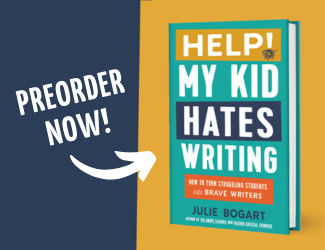Brave Learning: Spelling, Punctuation, My Kid Hates Writing, and more!
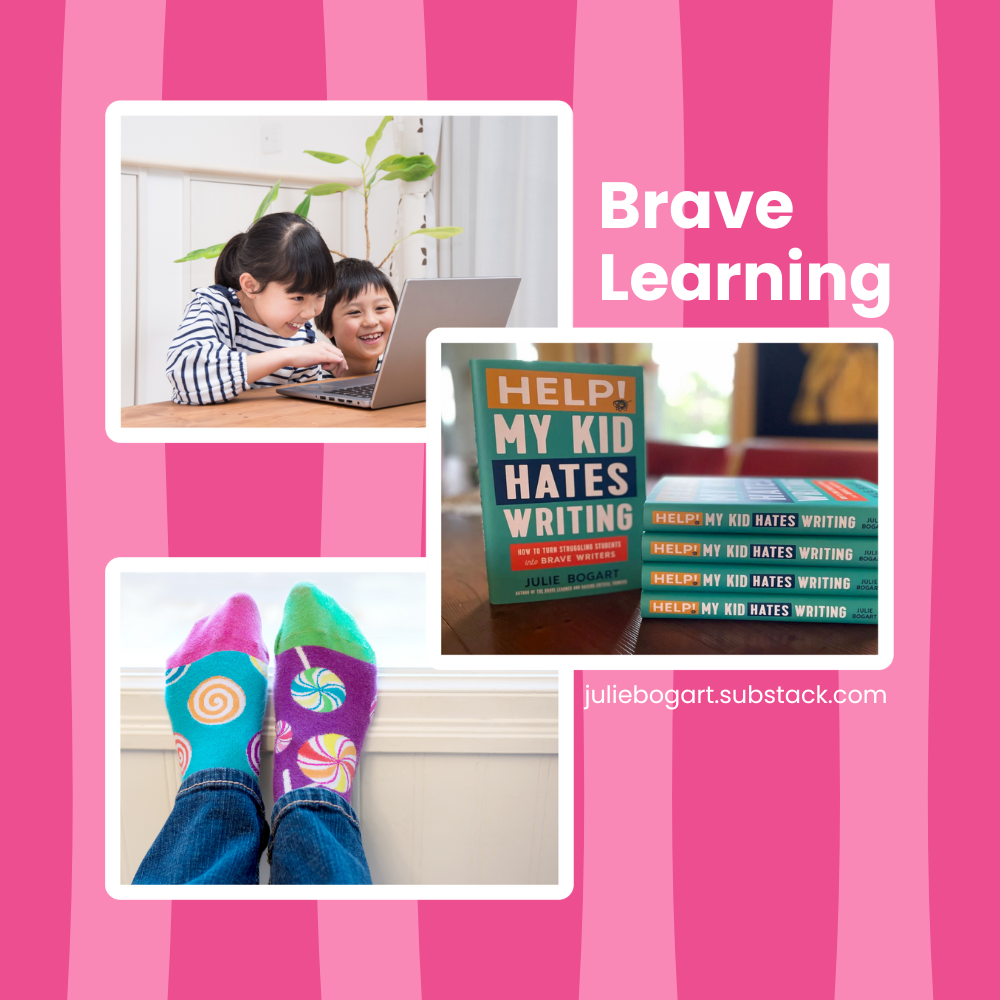
Recently on Brave Learning…
Just how important are spelling and punctuation anyway? [Public]
This is the last of our series on writing voice. [More]
Help! My Kid Hates Writing [Public]
Turning Struggling Students into Brave Writers [More]
Writing Prompt: The Great Sock Debate [Public]
Freewriting is that wonderful key that unlocks the writer within. [More]
Subscribe to Brave Learning on Substack where we chat, discuss, problem-solve, and create together. Here’s what you can expect: weekly themed content, freewriting prompts, and a podcast for kiddos called Monday Morning Meeting (first 6 are free)!
[Podcast #282] Help! What if you hate teaching writing?
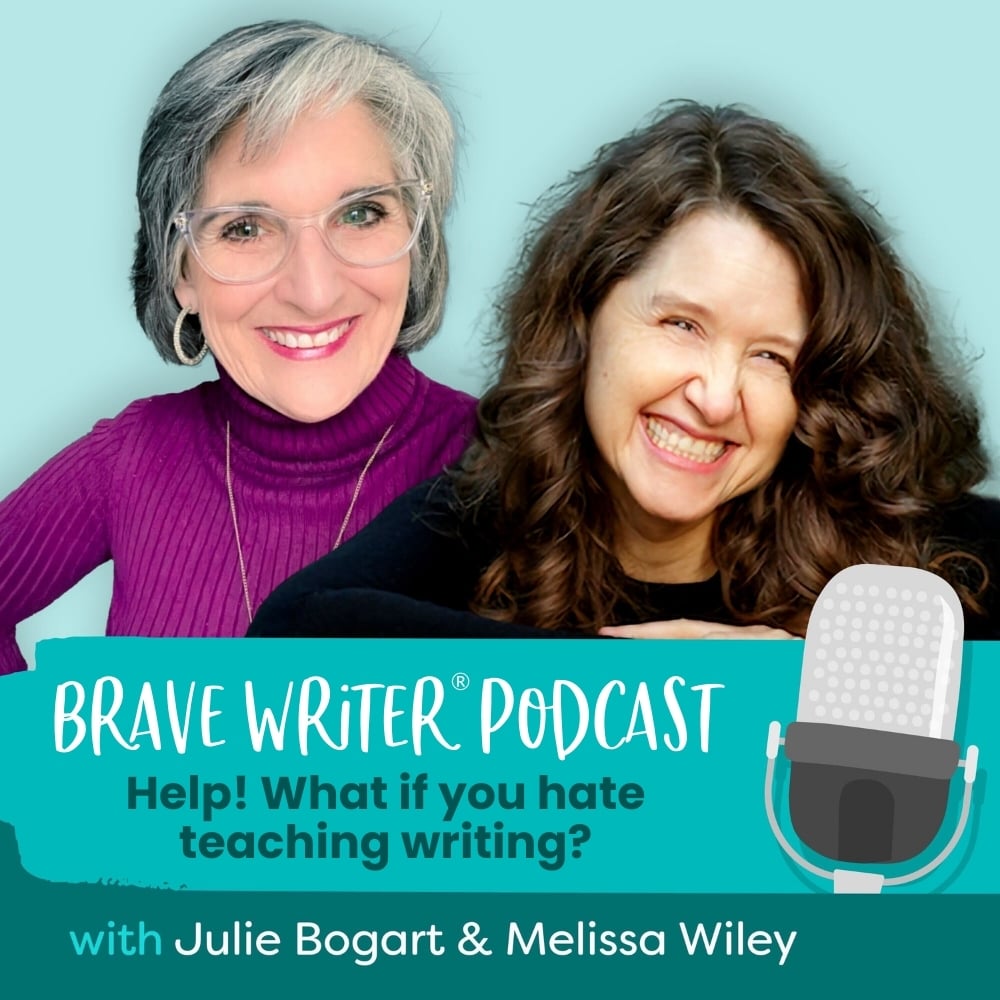
Do your kids hate writing? You’re not alone.
In this Brave Writer podcast episode, we explore why so many children (and adults!) feel blocked when it comes to writing—and why it’s more important than ever to teach kids to write from scratch, even in an age of AI.
We look at:
- the emotional power of writing,
- the damage done by performance-based instruction,
- and how we can shift our approach to help kids see themselves as thinkers and communicators.
Listen to hear an excerpt from Julie’s new book, Help! My Kid Hates Writing, and learn how to turn struggling students into brave writers.
Show Notes
We’ve all had moments when writing felt like a public trial—every word scrutinized, every typo judged. In a world where artificial intelligence can compose an entire essay faster than we can pour a cup of tea, it’s fair to ask: why even bother teaching kids to write at all?
Here’s why.
Writing is self-expression, not just self-presentation.
It’s tempting to see writing as a performance for others. But at its core, writing is about externalizing our internal world. When kids are given the freedom to write what they truly think—even if it starts with “I hate this”—they start to connect with their own voice. That’s when transformation happens. Writing isn’t just for grades; it’s for healing, discovery, and clarity.
Yes, AI exists. No, it doesn’t replace your child.
Sure, technology has made it easier to bypass the hard parts of writing. But it hasn’t replaced the most valuable part: the human part. No machine can replicate your child’s one-of-a-kind perspective. We write because no one else can think exactly what we think. We write to preserve our voice in a way no algorithm can duplicate.
Kids love writing—they just don’t love school writing.
Give a child a phone, and they’ll write all night. Texts, captions, comments, scripts—they’re already writing. But it’s writing that feels meaningful to them. What they resist is the sterile, formulaic kind of writing we often assign in school. When we reposition writing as a tool for thinking, creativity, and connection—not just academic performance—it becomes something worth doing.
We teach writers, not just writing.
When we put the writer at the center instead of the assignment, we unlock something powerful. Kids become thinkers, not just students fulfilling a rubric. They clarify their ideas, explore their feelings, and build confidence in their ability to communicate. That’s why writing is still worth teaching—even if your kid hates it right now.
We believe the act of putting words on a page is a deeply human endeavor. It deserves care, respect, and even joy. Our job is to help kids find their way into writing—not by force, but by helping them see the value of their own thoughts.
And here’s the truth: when they realize their ideas matter, writing stops being a chore and starts becoming a tool they can use for the rest of their lives.
Resources
- Check out Julie’s new author website: juliebogartwriter.com!
- Purchase Julie’s new book, Help! My Kid Hates Writing. Pre-order includes:
- PDF “Free the Writer in You” Family Freewriting Guide
- 3 Months of the Paid Substack Subscription for free (starts 4/15/2025)
- Claim your pre-order bonuses here
- Subscribe to Julie’s Substack newsletters: Brave Learning with Julie Bogart and Julie Off Topic
- Try out our Brave Writer Practice Pages
- Learn more about the Brave Writer Literature & Mechanics programs
- Read all Brave Writer class descriptions
- Start a free trial of CTCmath.com to try the math program that’s sure to grab and keep your child’s attention
- Sign up for our Text Message Pod Ring to get podcast updates and more!
- Send us podcast topic ideas by texting us: +1 (833) 947-3684
Connect with Julie
- Instagram: @juliebravewriter
- Threads: @juliebravewriter
- Bluesky: @bravewriter.com
- Facebook: facebook.com/bravewriter
Connect with Melissa
- Website: melissawiley.com
- Substack: melissawiley.substack.com
- Instagram: @melissawileybooks
- Bluesky: @melissawiley.bsky.social
Produced by NOVA
What’s the Point of Grades?
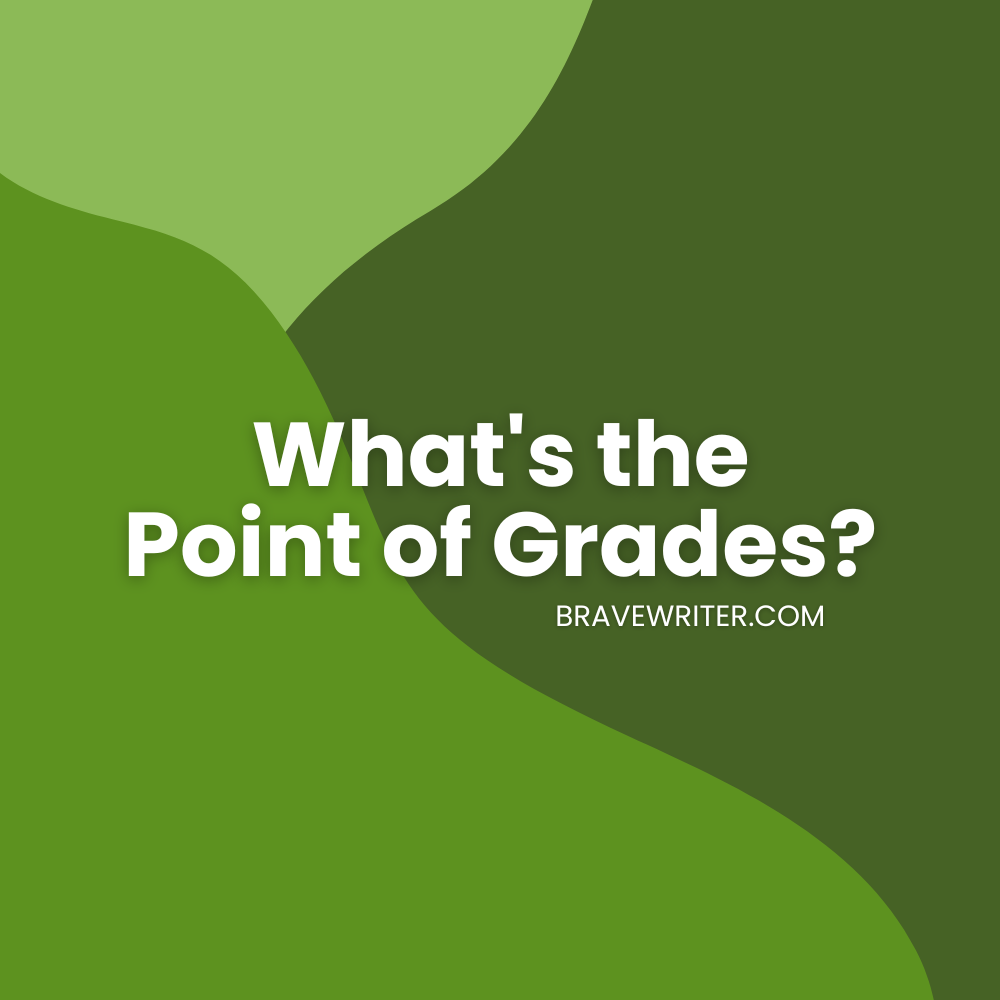
For homeschoolers, grading is pretty irrelevant. Grades were designed to help a teacher communicate with a parent who isn’t present in the classroom to know if their child is doing a good enough job keeping up with the class content. At home, you know how your child is doing. Who is the grade for?
If you give grades because you want to build a transcript for admission to a school, just know that most universities and high schools don’t trust your grades anyway! There’s no way to “norm” the grades a parent gives. Sometimes the parent is generous, sometimes punitive. How can a school rely on parent-generated grades? They can’t!
What sets homeschooled kids apart?
- Their unique interests
- The overall composition of their coursework (what they studied and how)
- Their personal narrative essays where they demonstrate that learning
Colleges, in particular, are looking for a diversity of experiences in their freshman classes. They want kids who care about learning and have shown that passion.
The bottom line is: don’t sacrifice learning for the standardized education that drew you to homeschooling in the first place! If you want that standard education, send them to school! Otherwise, take advantage of the opportunity to live a rich life of learning that is not demonstrated by grades but by mastery, passion, and depth!
Brave Learning: A Lively Voice, Disarming Your Teens, and more!
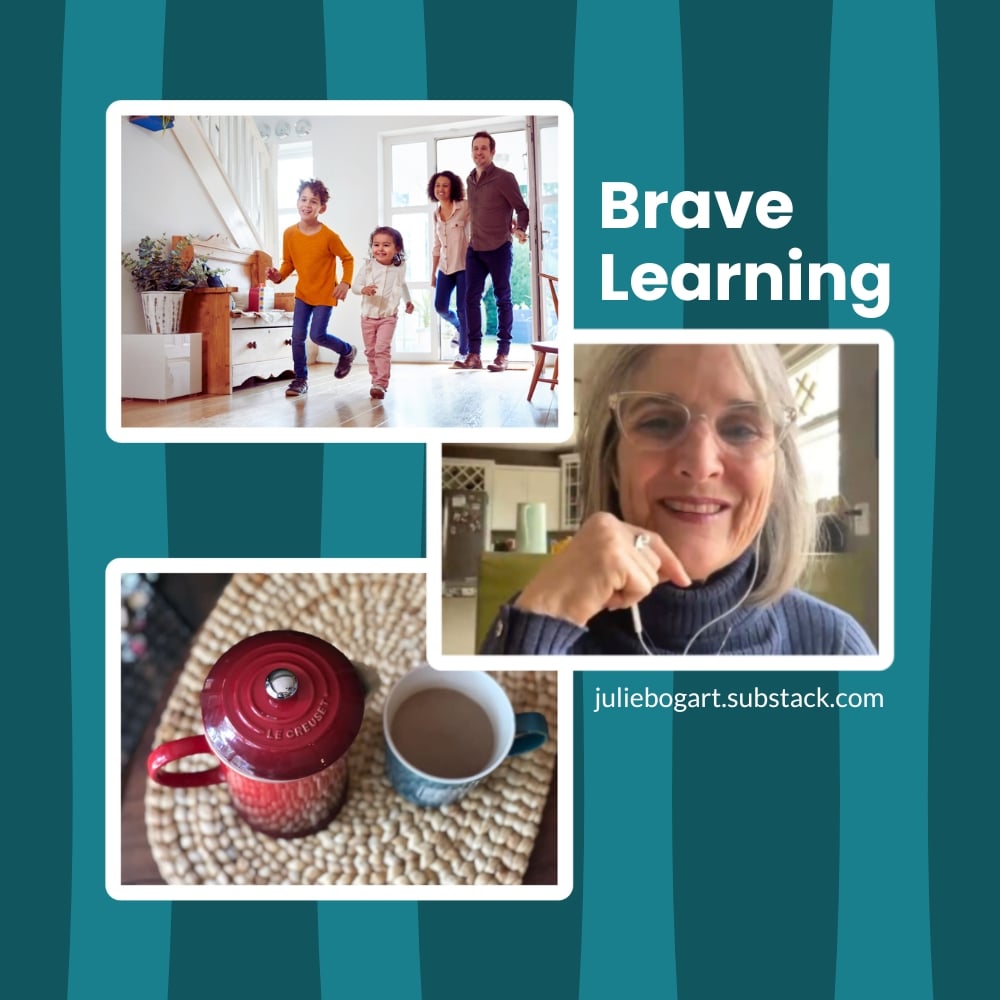
Recently on Brave Learning…
Fill the “house” with a lively voice! [Public]
Here’s the third part of our series on writing voice. [More]
Hello! 👋 [Public]
A recording of Julie’s live video. [More]
Disarming Your Teens
What a cup of coffee will do… [More]
Subscribe to Brave Learning on Substack where we chat, discuss, problem-solve, and create together. Here’s what you can expect: weekly themed content, freewriting prompts, and a podcast for kiddos called Monday Morning Meeting (first 6 are free)!
[Podcast #281] Deep Meaning = Depth Learning
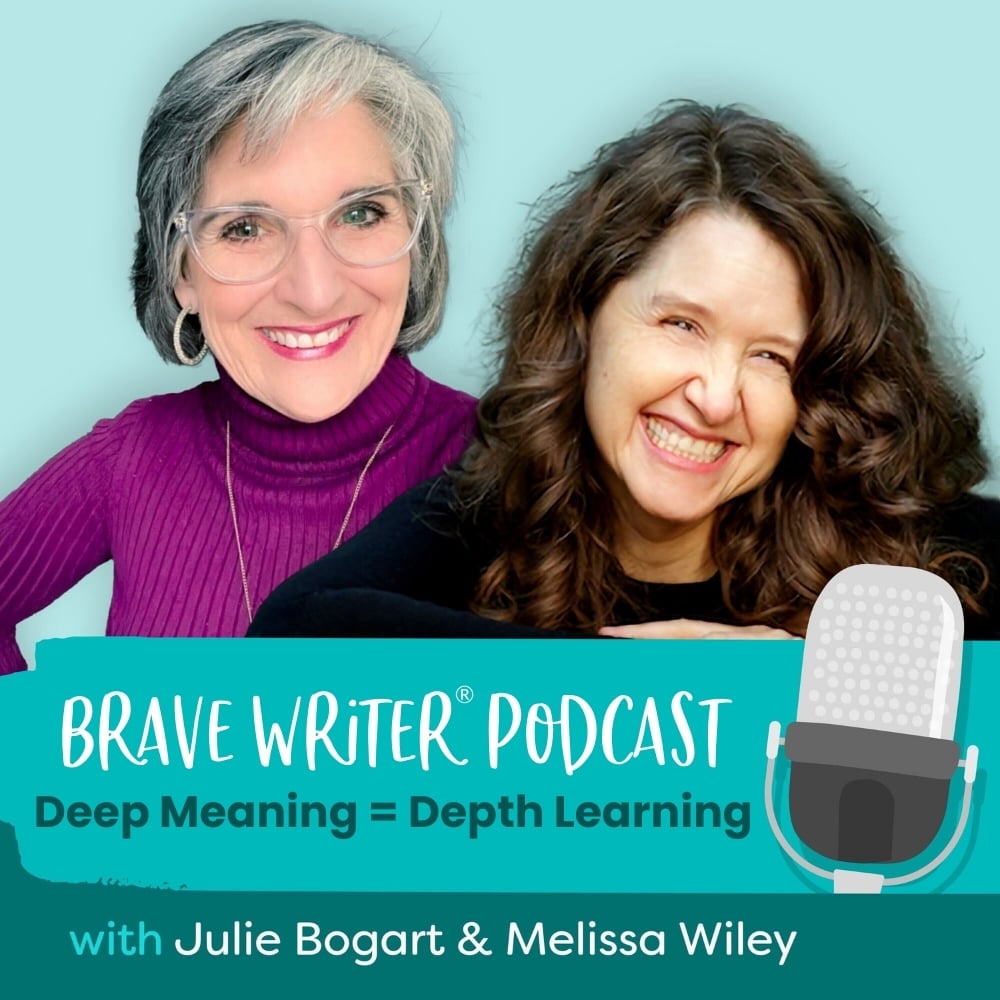
Do you ever wonder why some lessons stick and others fade away?
In this Brave Writer podcast episode, we explore the concept of deep meaning—the essential ingredient behind lasting, joyful learning. When kids connect personally with what they’re learning, they move beyond memorization into true expertise. We:
- unpack the difference between mastery and meaning,
- share real-life examples from homeschooling life (yes, video games and comic books count!), and
- offer practical questions you can ask to build more meaningful learning moments at home.
Listen now to discover how to help your kids not just think, but care about what they’re learning.
Show Notes
In every learning experience, there’s a pivotal question waiting to be answered: “Why do I need to know this?” It’s a question we’ve all heard from our kids—and maybe even asked ourselves. When children ask this, they’re not simply being resistant. They’re pointing to something deeper. They want to understand the meaning behind what they’re learning.
What if, instead of focusing on mastery through memorization, we shifted our educational focus to meaning? That’s where true learning—the kind that sticks—really begins.
Mastery vs. Expertise
We often conflate “mastery” with success: a child memorizes a grammar rule or completes a worksheet correctly. But real expertise goes beyond that. It involves a felt sense of how knowledge fits into a broader framework. It’s the difference between identifying a hyperbole on a test and joyfully recognizing it in a read-aloud story. One is performance. The other is evidence of integration—of natural knowledge built on passion and relevance.
Meaning Drives Passion
When learning taps into a child’s deep meanings—their interests, relationships, curiosities—it unlocks a sense of purpose. This is true whether they’re exploring the economics of crops in a farming game, testing physics in Angry Birds, or reading about their favorite superheroes. We tend to elevate subjects like violin, poetry, or chess as “prestigious,” while dismissing games or pop culture as frivolous. But children don’t see that hierarchy—they’re driven by what sparks their engagement, not what looks good on a transcript.
Experience Builds Understanding
Real learning requires more than facts—it needs context and experience. Just like a child learns the power of scissors by cutting the fur off a beloved stuffed animal, learning needs to be hands-on. Tracing tanks from a history book, graphing fallen leaves in the front yard, or building a model of Helm’s Deep while listening to Tolkien—all of these create neural interconnections that form lasting knowledge. It’s not about rushing to mastery but slowing down to build meaning.
Learning That Feels Like Play
The best learning often doesn’t look like school. It looks like play. It looks like kids constructing domino patterns, arguing over where to place index cards in a homemade history timeline, or sitting quietly with a nature journal. These are not distractions from learning—they are learning. When kids care about what they’re doing, they:
- challenge themselves naturally,
- cope with mistakes, and
- absorb information more deeply.
Our Role as Parents
As educators and caregivers, our job is not to manufacture meaning, but to create the conditions for it to emerge. That means offering rich, varied experiences, and sometimes stepping back to let our kids make the connections themselves. Especially as they get older, they begin to link content to their lives in new and unexpected ways—and our job is to listen and support.
Deep learning comes from deep meaning. When we prioritize our children’s curiosity and let their passions shape their educational journeys, we invite them into a lifetime of caring, thinking, and discovering. That’s not just good education—it’s good living.
Resources
- Check out Julie’s new author website: juliebogartwriter.com!
- Subscribe to Julie’s Substack newsletters: Brave Learning with Julie Bogart and Julie Off Topic
- Try out our Brave Writer Practice Pages
- Learn more about the Brave Writer Literature & Mechanics programs
- Read all Brave Writer class descriptions
- Start a free trial of CTCmath.com to try the math program that’s sure to grab and keep your child’s attention
- Sign up for our Text Message Pod Ring to get podcast updates and more!
- Send us podcast topic ideas by texting us: +1 (833) 947-3684
Connect with Julie
- Instagram: @juliebravewriter
- Threads: @juliebravewriter
- Bluesky: @bravewriter.com
- Facebook: facebook.com/bravewriter
Connect with Melissa
- Website: melissawiley.com
- Substack: melissawiley.substack.com
- Instagram: @melissawileybooks
- Bluesky: @melissawiley.bsky.social
Produced by NOVA























